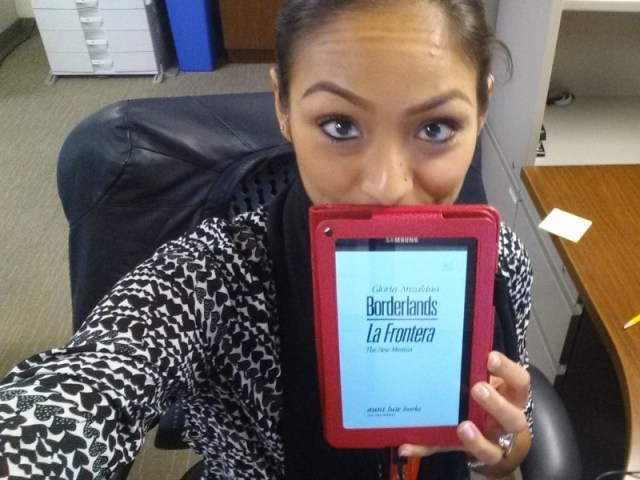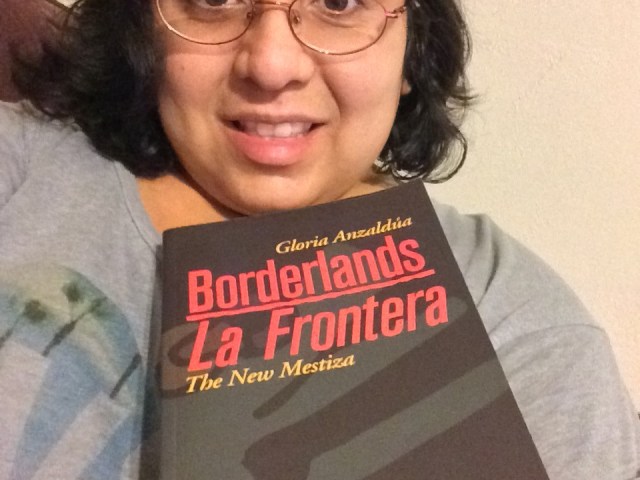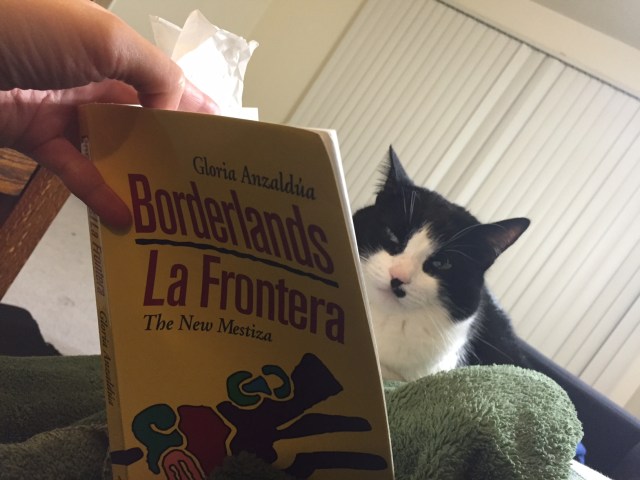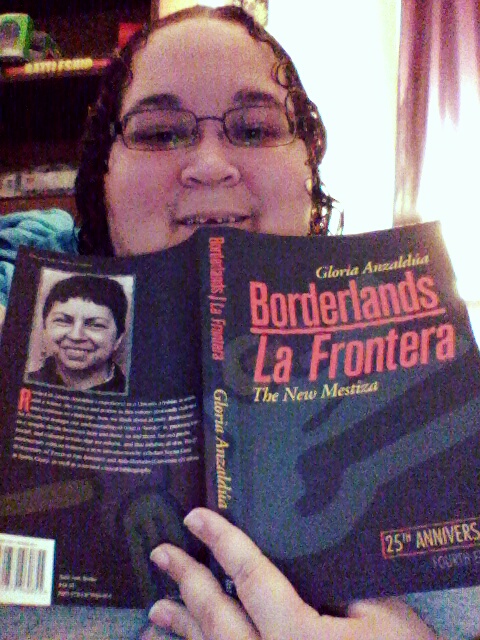This past month, your favorite QTPOC think tank/cuddle collective has been reading Borderlands/La Frontera by Gloria Anzaldúa. There was a lot going on in this one, so let’s talk about it!
Here are some Speakeasy members with their brilliant thoughts, gorgeous faces and favorite quotes.

Nicolette:
“At a very early age I had a strong sense of who I was and what I was about and what was fair. I had a stubborn will.” – The Strength of My Rebellion
Growing up, adults never hesitated to remind me that I was a motor-mouthed, bossy, determined child. I didn’t say yes ma’am or no ma’am, I talked back to adults, and would not hesitate to tell you if I didn’t like something. I grew up thinking I was a bad girl because good girls didn’t act the way I acted. Looking back I wasn’t good or bad, I was just a child who was clear about what I liked and didn’t like.
I wasn’t the only person who received this good girl bad girl messaging growing up. I can’t tell you how many times I saw girls being torn to shreds by mothers, sisters, friends, and elders because they felt comfortable with their sexuality, their body, and their opinions.
Comfort and confidence within themselves marked them as rebels because it meant they were thumbing their nose to the respectability politics that was being forced on them by cultural tyrants.
“We are afraid of being abandoned by the mother, the culture, la Raza, for being unacceptable, faulty, damaged.” – Fear of Going Home: Homophobia
Being a woman means you are corralled and forced into submission by the community at large, but you are still part of it. Being a lesbian, though, means you could lose your place in your community. Parents have told children not to come home, siblings have stopped returning calls, and countless other stories of homes being ripped out from under one’s feet because how you love is deemed as “deviant.” It’s why I waited so long to come out because I didn’t want to lose my home. I didn’t want the only thing I had ever known to be taken away from me. So I ignored my desires in order not to lose everything I loved.
I read and re-read those sections because it was crazy seeing how much cultural tyranny has reared its ugly head in my life and those around me. In particular the added impact it causes for those who have intersecting identities that are marked as less than. I’m happy that Anzaldúa is speaking truth to power on these issues, and waging rebellion with her words.

Laura:
To be honest, I really struggled with this book.
When I first started reading, I wanted to translate all of the words that weren’t English. If there was something awesome being said, I didn’t want to miss it! I studied a bit of Spanish in high school and college, so I gamely attacked the (super narrow!) margins with my notes, planning to run everything I didn’t know through Google translate when I got back to a computer. That lasted like, not even 20 pages. I do most of my reading on my morning subway commute, which doesn’t really lend itself to this activity. Actually it doesn’t lend itself to reading heavy, theory-laden books at all… But that’s a problem with me, I guess, not the text. I’m just saying: this wasn’t a light read, nor a super enjoyable one for me.
I went on this way for several chapters, until I read a passage in “How To Tame A Wild Tongue” that stopped me dead in my tracks.
“I am my language. Until I can take pride in my language, I cannot take pride in myself. Until I can accept as legitimate Chicano Texas Spanish, Tex-Mex and all the other languages I speak, I cannot accept the legitimacy of myself. Until I am free to write bilingually and to switch codes without always having to translate, while I still have to speak English or Spanish when I would rather speak Spanglish, and as long as I have to accomodate the English speakers rather than having them accommodate me, my tongue will be illegitimate. I will no longer be made to feel ashamed of existing.” – How To Tame A Wild Tongue
Because oh my God. Yes. I get it. What Anzaldúa did with her writing — leaving the reader to make their own translations, rather than her bending over backwards to accommodate then — was so, so important. I love that idea, even if the result is a work that’s less accessible to me as an individual. That’s kind of the point.
Similarly, her use of dreamlike imagery wasn’t the easiest thing to read, but once I got to her explanation of why she writes in this fashion, everything sort of clicked. I’m still not a huge fan of her poetic departures, but I understand why she did it and I respect it.
“For the ancient Aztecs, tlilli, tlapalli, la tinta negra y roja de sus códices (the black and red ink painted on codices) were the colors symbolizing escritura y sabiduría (writing and wisdom). They believed that through metaphor and symbol, by means of poetry and truth, communication with the Divine could be attained … An image is a bridge between evoked emotion and conscious knowledge; words are the cables that hold up the bridge.” – The Path of the Red and Black Ink
Poetry makes me feel illiterate, sometimes. But I guess if that’s what it takes to get to understanding, I’m okay with it. In general, I think that’s what Anzaldúa is absolutely genius at: putting into words some of the nebulous feelings that I (and others) have had but was never able to solidify into sentences.
As a biracial person, I really loved all the things she said about straddling identities and crossing borders.
“These numerous possibilities leave la mestiza floundering in uncharted seas. In perceiving conflicting information and points of view, she is subjected to a swamping of her psychological borders. She has discovered that she can’t hold concepts or ideas in rigid boundaries. The borders and walls that are supposed to keep the undesirable ideas out are entrenched habits and patterns of behavior; these habits and patterns are the enemy within. Rigidity means death. Only by remaining flexible is she able to stretch the psyche horizontally and vertically. … The new mestiza copes by developing a tolerance for contradictions, a tolerance for ambiguity.” – Towards a New Consciousness
I think she gets a little out there and utopian by the end (at one point she says that gay people link whites with extraterrestrials??), but because there was so much metaphor going over my head in other parts, it seems like a safe assumption to say that I may have missed something there. If anyone wants to explain it to me, I’d really appreciate it.

Maggie:
Borderlands has been such an influential book for me. I found it particularly validating that Anzaldúa embraces her indigenous heritage in a way that most of us mestizo/as have not. I found myself missing a heritage, a history, that should have been mine but was denied to me. All the time I was reading Borderlands, I felt an ache in my heart, the ache of homesickness. I felt a longing to return to my childhood hometown, where everyone spoke Spanish or Spanglish. I could really relate to the feeling of straddling two cultures and not fully belonging to either one. Sometimes I fear that I’ve become too “gabacha,” too white, to feel like I can authentically embrace a Latina identity. At the same time, I know that my heritage and upbringing are not completely white American, either. Borderlands made me hope for a place, even if it’s not a physical one, in which those of us with mixed heritages can create a place of belonging for ourselves, where we are never too much this or not enough that.
“As a mestiza I have no country, my homeland cast me out; yet all countries are mine because I am every woman’s sister or potential lover. (As a lesbian I have no race, my own people disclaim me; but I am all races because there is the queer of me in all races.) I am cultureless because, as a feminist, I challenge the collective cultural/religious male-derived beliefs of Indo-Hispanics and Anglos; yet I am cultured because I am participating in the creation of yet another culture, a new story to explain the world and our participation in it, a new value system with images and symbols that connect us to each other and to the planet.” – Towards a New Consciousness

Sonia:
This is the first Gloria Anzaldúa work I have read. I enjoyed it, but I really struggled through it. As someone recently diagnosed with ADHD and as someone with a very limited Spanish language education, I often found myself reading the book and having 15+ tabs open on my browser for Google Translate, Wikipedia, YouTube, and the like. One time I couldn’t figure out why I had spent 3 hours on the internet, and only then remembered that I had been trying to read the book and had not gotten more than a page, so lost was I on a tangent of discovery. In this way, the book felt to me paradoxically both immersive and disjointed.I loved the unapologetic sentiment in the Preface to the First Edition: that the multilingualism in the book is her identity, that for too long she has felt the need to beg entrance to spaces, that she has had to accommodate the humanity of others while her own is denied. It reminded me of those who feel entitled to a translation or feel threatened by linguistic diversity. The Junot Diaz quote comes to mind:
“Motherfuckers will read a book that’s one third Elvish, but put two sentences in Spanish and they [white people] think we’re taking over.” – Junot Diaz
“How to Tame a Wild Tongue” really resonated with me, and it made me think more about how language is used to colonize, exclude, enforce racial hierarchies, and delegitimize others. While I’ll never know how it feels to be Latina or Chicana in the US, I could draw many parallels to my own experiences as an Asian American QPOC, such as Anzaldúa being punished for speaking Spanish at school, being dismissed when explaining how to pronounce one’s name, being shamed for speaking accented English by white folks while simultaneously being shamed for not speaking “real” Spanish by one’s own community.
I was raised in a sort of borderland. As Anzaldúa writes, there are physical borderlands, psychological borderlands, borderlands that are “present wherever two or more cultures edge each other, where people of different races occupy the same territory.” I grew up in an area of predominately white people and East Asians, with racial dynamics that were full of anti-Asian microaggressions. Mandarin Chinese was my first language, and I spoke English with a Chinese accent for the first 4 years of my life. Growing up, I lost my Chinese accent, and I witnessed my parents (both trilingual) overtly or subtly dismissed, disrespected, or ridiculed for their accented English.
In this chapter, there is a quote by Ray Gwyn Smith:
“Who is to say that robbing a people of its language is less violent than war?” – Ray Gwyn Smith
Only recently I learned that my mother got her Americanized name when a racist graduate school administrator took one look at her name on the roster and said, “Well. That’s not going to happen. From now on I’ll call you Terry.” It made me so angry to learn of this, especially later in life. There was a sense of violence and violation. I resented completely how this one tiny act bore its way through time and space, and how one insignificant and racist person (my mom doesn’t even remember her name anymore, ha ha) could have had such an impact on my mother’s personal identity, and in part, on mine and my family’s.
Yvonne:
God, I don’t even know where to begin to tell you how much this book reverberated with me. I started reading Borderlands while I was on an early morning flight to the Valley, my home and the borderland that is central to Gloria Anzaldúa’s book. I don’t know if it was because it was 8 a.m., I was sleep deprived and highly caffeinated but reading this book on a plane was such an outer body experience. I don’t know how to explain it — I was up in the air, in this weird limbo, flying from Dallas to the Valley, to the same place Gloria is talking about in her book, dissecting her identities and feelings, many of which are similar to mine.
In “The Strength in my Rebellion,” Anzaldúa writes “I had to leave home to find myself…” and I was like me too, Gloria, me too. I left my home for college but mostly because I couldn’t be my queer self in the Valley; I felt ashamed, I was filled with anxiety and didn’t like the way I felt when I was there. I had to leave. I did leave and I learned to love myself and accept all of my queerness. In Chapter 2 “Movimientos de rebeldia y las culturas que traicionan,” Gloria writes more about the internal conflict she felt for leaving her home, what her family and culture thought of her for doing so, what it meant for her identity and about this fear she feels going home, yet how her home permeates her very being. That’s how exactly how I feel too. It’s been 6 years since I’ve left the Valley but the Valley is alive inside of me, wherever I go.
“Yet leaving home I did not lose touch with my origins because lo mexicano is in my system.” – Intimate Terrorism: Life in the Borderlands
It seems Anzaldúa’s “How To Tame A Wild Tongue” resonated with lots of us. When I read that chapter, I felt like everything finally clicked, like every single linguistic struggle I’ve experienced made sense and I no longer felt ashamed.
I grew up speaking what Anzaldúa calls Chicano Spanish, a language made by the borderlands, and I always felt bad for not speaking “proper” Spanish. When I studied abroad in Spain, I was part of a small program, only 7 girls, with the majority of them being white. My instructors and my classmates expected my Spanish, along with my other Latina classmate’s, to be stellar. Both of us grew up speaking Spanish with our families so of course they thought the language barrier wouldn’t be a problem in Spain. I can’t speak on behalf of my Latina classmate but I know for sure I struggled with communicating in Spain, even more so than my white classmates who learned formal Spanish in the classroom. I was never taught Spanish; I was born into it so I didn’t know how to write or read it until I learned in high school and college. I only knew the words my family shared with me, making it difficult for me to unlearn them and use the “correct” words. While my study abroad classmates discussed things in class with their textbook Spanish in an American accent, I spoke with my hybrid language that everyone thought was wrong.
My girlfriend’s Spanish is perfect. She was born in Mexico and her parents only speak Spanish. She’s always corrected my Spanish for fear that we’ll forget it, mostly that I’ll forget it because I don’t speak it on a daily basis like I use to in the Valley. She tells me I’m not pronouncing things right or the accent is on this letter, not that one or you’re missing a syllable or no, that’s not even the right word. I know she means well but I can’t help but feel embarrassed about the Spanish I speak.
Chicano Spanish is not incorrect, it is a living language. – Oye como ladra: el lenguaje de la frontera
In chapter 5, Anzaldúa breaks down how Chicano Spanish came to be and describes the evolution of how we pronounce certain words in our vernacular. It wasn’t until reading her words that I realized the language I speak is legitimate, that I shouldn’t be ashamed of the language that was passed down to me. It’s not the same language that was passed down to my girlfriend or the one found in textbooks. It is mine, a “secret language” and it lets me communicate my true realities.

So what did you all think? Don’t be shy. This discussion is open to the entire Autostraddle community, and we want to talk to you!
To start, here are some burning questions we have for you:
- Where do you like to read?
- What did you think about Anzaldúa’s use of language? Did the structure work for you?
- What intersecting identities do you have, and how do you think that impacted your reading?
- Did you translate as you read? Why or why not?
- What’s your favorite Gloria Anzaldúa quote?
If you haven’t picked up Borderlands/La Frontera yet, publisher Aunt Lute has it on sale at a 20% discount!
Aunt Lute Books is a non-profit publishing press that publishes women and highlights the work of women of color and queer women, including Speakeasy favorite Audre Lorde.







